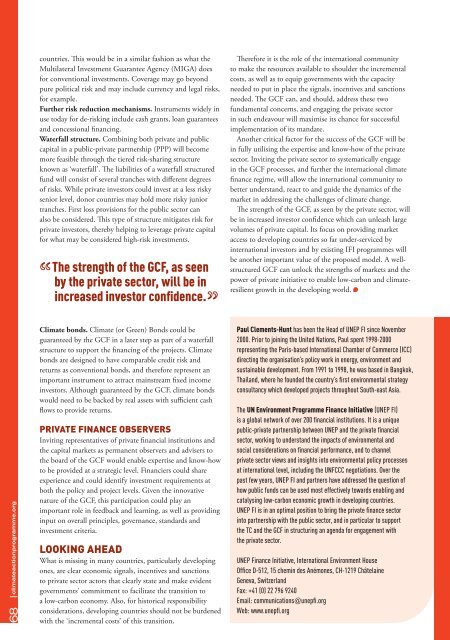Climate Action 2011-2012
You also want an ePaper? Increase the reach of your titles
YUMPU automatically turns print PDFs into web optimized ePapers that Google loves.
countries. This would be in a similar fashion as what the<br />
Multilateral Investment Guarantee Agency (MIGA) does<br />
for conventional investments. Coverage may go beyond<br />
pure political risk and may include currency and legal risks,<br />
for example.<br />
Further risk reduction mechanisms. Instruments widely in<br />
use today for de-risking include cash grants, loan guarantees<br />
and concessional financing.<br />
Waterfall structure. Combining both private and public<br />
capital in a public-private partnership (PPP) will become<br />
more feasible through the tiered risk-sharing structure<br />
known as ‘waterfall’. The liabilities of a waterfall structured<br />
fund will consist of several tranches with different degrees<br />
of risks. While private investors could invest at a less risky<br />
senior level, donor countries may hold more risky junior<br />
tranches. First loss provisions for the public sector can<br />
also be considered. This type of structure mitigates risk for<br />
private investors, thereby helping to leverage private capital<br />
for what may be considered high-risk investments.<br />
The strength of the GCF, as seen<br />
by the private sector, will be in<br />
increased investor confidence.<br />
Therefore it is the role of the international community<br />
to make the resources available to shoulder the incremental<br />
costs, as well as to equip governments with the capacity<br />
needed to put in place the signals, incentives and sanctions<br />
needed. The GCF can, and should, address these two<br />
fundamental concerns, and engaging the private sector<br />
in such endeavour will maximise its chance for successful<br />
implementation of its mandate.<br />
Another critical factor for the success of the GCF will be<br />
in fully utilising the expertise and know-how of the private<br />
sector. Inviting the private sector to systematically engage<br />
in the GCF processes, and further the international climate<br />
finance regime, will allow the international community to<br />
better understand, react to and guide the dynamics of the<br />
market in addressing the challenges of climate change.<br />
The strength of the GCF, as seen by the private sector, will<br />
be in increased investor confidence which can unleash large<br />
volumes of private capital. Its focus on providing market<br />
access to developing countries so far under-serviced by<br />
international investors and by existing IFI programmes will<br />
be another important value of the proposed model. A wellstructured<br />
GCF can unlock the strengths of markets and the<br />
power of private initiative to enable low-carbon and climateresilient<br />
growth in the developing world.<br />
68 climateactionprogramme.org<br />
<strong>Climate</strong> bonds. <strong>Climate</strong> (or Green) Bonds could be<br />
guaranteed by the GCF in a later step as part of a waterfall<br />
structure to support the financing of the projects. <strong>Climate</strong><br />
bonds are designed to have comparable credit risk and<br />
returns as conventional bonds, and therefore represent an<br />
important instrument to attract mainstream fixed income<br />
investors. Although guaranteed by the GCF, climate bonds<br />
would need to be backed by real assets with sufficient cash<br />
flows to provide returns.<br />
PrivaTe FinanCe observers<br />
Inviting representatives of private financial institutions and<br />
the capital markets as permanent observers and advisers to<br />
the board of the GCF would enable expertise and know-how<br />
to be provided at a strategic level. Financiers could share<br />
experience and could identify investment requirements at<br />
both the policy and project levels. Given the innovative<br />
nature of the GCF, this participation could play an<br />
important role in feedback and learning, as well as providing<br />
input on overall principles, governance, standards and<br />
investment criteria.<br />
lookinG ahead<br />
What is missing in many countries, particularly developing<br />
ones, are clear economic signals, incentives and sanctions<br />
to private sector actors that clearly state and make evident<br />
governments’ commitment to facilitate the transition to<br />
a low-carbon economy. Also, for historical responsibility<br />
considerations, developing countries should not be burdened<br />
with the ‘incremental costs’ of this transition.<br />
Paul Clements-Hunt has been the Head of UNEP FI since November<br />
2000. Prior to joining the United Nations, Paul spent 1998-2000<br />
representing the Paris-based International Chamber of Commerce (ICC)<br />
directing the organisation’s policy work in energy, environment and<br />
sustainable development. From 1991 to 1998, he was based in Bangkok,<br />
Thailand, where he founded the country’s first environmental strategy<br />
consultancy which developed projects throughout South-east Asia.<br />
The UN Environment Programme Finance Initiative (UNEP FI)<br />
is a global network of over 200 financial institutions. It is a unique<br />
public-private partnership between UNEP and the private financial<br />
sector, working to understand the impacts of environmental and<br />
social considerations on financial performance, and to channel<br />
private sector views and insights into environmental policy processes<br />
at international level, including the UNFCCC negotiations. Over the<br />
past few years, UNEP FI and partners have addressed the question of<br />
how public funds can be used most effectively towards enabling and<br />
catalysing low-carbon economic growth in developing countries.<br />
UNEP FI is in an optimal position to bring the private finance sector<br />
into partnership with the public sector, and in particular to support<br />
the TC and the GCF in structuring an agenda for engagement with<br />
the private sector.<br />
UNEP Finance Initiative, International Environment House<br />
Office D-512, 15 chemin des Anémones, CH-1219 Châtelaine<br />
Geneva, Switzerland<br />
Fax: +41 (0) 22 796 9240<br />
Email: communications@unepfi.org<br />
Web: www.unepfi.org












